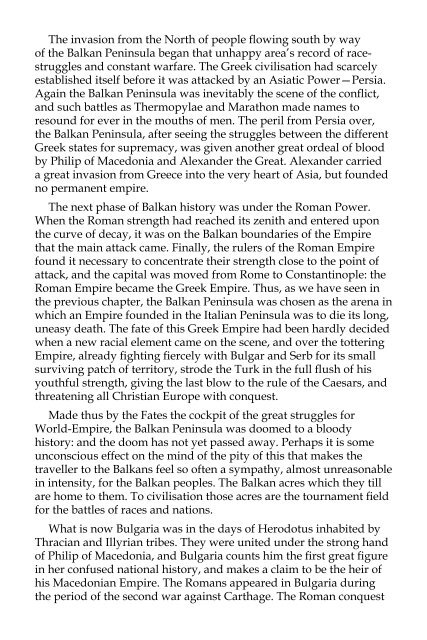Bulgaria e-book - iMedia
Bulgaria e-book - iMedia
Bulgaria e-book - iMedia
Create successful ePaper yourself
Turn your PDF publications into a flip-book with our unique Google optimized e-Paper software.
The invasion from the North of people flowing south by way<br />
of the Balkan Peninsula began that unhappy area’s record of racestruggles<br />
and constant warfare. The Greek civilisation had scarcely<br />
established itself before it was attacked by an Asiatic Power—Persia.<br />
Again the Balkan Peninsula was inevitably the scene of the conflict,<br />
and such battles as Thermopylae and Marathon made names to<br />
resound for ever in the mouths of men. The peril from Persia over,<br />
the Balkan Peninsula, after seeing the struggles between the different<br />
Greek states for supremacy, was given another great ordeal of blood<br />
by Philip of Macedonia and Alexander the Great. Alexander carried<br />
a great invasion from Greece into the very heart of Asia, but founded<br />
no permanent empire.<br />
The next phase of Balkan history was under the Roman Power.<br />
When the Roman strength had reached its zenith and entered upon<br />
the curve of decay, it was on the Balkan boundaries of the Empire<br />
that the main attack came. Finally, the rulers of the Roman Empire<br />
found it necessary to concentrate their strength close to the point of<br />
attack, and the capital was moved from Rome to Constantinople: the<br />
Roman Empire became the Greek Empire. Thus, as we have seen in<br />
the previous chapter, the Balkan Peninsula was chosen as the arena in<br />
which an Empire founded in the Italian Peninsula was to die its long,<br />
uneasy death. The fate of this Greek Empire had been hardly decided<br />
when a new racial element came on the scene, and over the tottering<br />
Empire, already fighting fiercely with Bulgar and Serb for its small<br />
surviving patch of territory, strode the Turk in the full flush of his<br />
youthful strength, giving the last blow to the rule of the Caesars, and<br />
threatening all Christian Europe with conquest.<br />
Made thus by the Fates the cockpit of the great struggles for<br />
World-Empire, the Balkan Peninsula was doomed to a bloody<br />
history: and the doom has not yet passed away. Perhaps it is some<br />
unconscious effect on the mind of the pity of this that makes the<br />
traveller to the Balkans feel so often a sympathy, almost unreasonable<br />
in intensity, for the Balkan peoples. The Balkan acres which they till<br />
are home to them. To civilisation those acres are the tournament field<br />
for the battles of races and nations.<br />
What is now <strong>Bulgaria</strong> was in the days of Herodotus inhabited by<br />
Thracian and Illyrian tribes. They were united under the strong hand<br />
of Philip of Macedonia, and <strong>Bulgaria</strong> counts him the first great figure<br />
in her confused national history, and makes a claim to be the heir of<br />
his Macedonian Empire. The Romans appeared in <strong>Bulgaria</strong> during<br />
the period of the second war against Carthage. The Roman conquest<br />
of the Balkan country was slow, but shortly before the Christian era<br />
the Roman provinces of Moesia and Thracia comprised most of what<br />
is now <strong>Bulgaria</strong>.<br />
In the days of Constantine, who removed the capital of his Empire<br />
to the Balkan Peninsula, Roman civilisation in what is now <strong>Bulgaria</strong><br />
was already being swamped by barbarian invasions. The Goths and<br />
the Huns ravaged the land fiercely without attempting to colonise<br />
it. The Slavs were invaders of another type. They came to stay. It<br />
was at the beginning of the third century that the Slavs made their<br />
first appearance, and, crossing the Danube, began to settle in the<br />
great plains between the river and the Balkan Mountains. Later, they<br />
went south-wards and formed colonies among the Thraco-Illyrians,<br />
the Roumanians, and the Greeks. This Slav occupation went on<br />
for several centuries. In the seventh century of the Christian era a<br />
Hunnish tribe reached the banks of the Danube. It is known that this<br />
tribe came from the Volga and, crossing Russia, proceeded towards<br />
ancient Moesia, where it took possession of the whole north-east<br />
territory of the Balkans between the Danube and the Black Sea. These<br />
were the Bulgars, or Bolgars. The Slavs had already imposed on the<br />
races they had found in the Peninsula their language and customs.<br />
The Bulgars, too, assumed the language of the Slavs, and some of<br />
their customs. The Bulgars, however, gave their name to the mixed<br />
race, and assumed the political supremacy.<br />
The analogy I have before suggested of the Norman invasion<br />
of England and the Bulgar invasion of <strong>Bulgaria</strong> generally holds<br />
good. The Slavs were a people who tilled the soil, cherished free<br />
institutions, fought on foot, were gentle in character. The Bulgars<br />
were nomads and pastoralists, obeying despotic chiefs, fighting as<br />
cavalry. They came as conquerors, but in time were absorbed in the<br />
more stable Slavonic type.<br />
Without a doubt the Bulgars were racially nearly akin to the<br />
Turks—first cousins at least. Mingling with the Slavs they adopted<br />
their language and many of their customs. But something of the<br />
Turk survives to this day in the character of the <strong>Bulgaria</strong>n people.<br />
It shows particularly in their treatment of their women. Though<br />
the <strong>Bulgaria</strong>n is monogamic he submits his wife to an almost harem<br />
discipline. Once married she lives for the family alone. Though she<br />
does not wear a veil in the streets it is not customary for her to go<br />
out from her home except with her husband, nor to receive company<br />
except in his presence, nor to frequent theatres, restaurants, or other<br />
places of public amusement. There is thus no social life in <strong>Bulgaria</strong> in





